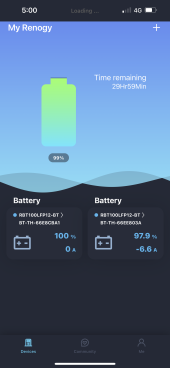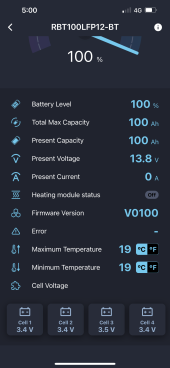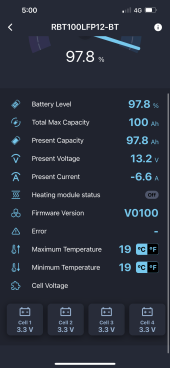StevieRuss
New Member
- Joined
- Jun 9, 2022
- Messages
- 21
I recently fitted two 100ah Renogy LifePo4 batteries to our van which replaces two ageing 120ah AGMs. I also fitted a Victron 100/30 which is supplied by three 120watt Renogy solar panels on the roof. There is also a 30amp DC charger running from the alternator.
So, both batteries charged to nearly 100% as reported by the iPhone app via bluetooth. After the first week, I noticed that only one of the batteries was discharging with the other supplying the full load. On checking the cell voltages the battery that was not discharging had the cells at these voltages
cell 1 - 3.4v
cell 2 - 3.4v
cell 3 - 3.5v
cell 4 - 3.4v
The batteries do self balance and the battery that was actually doing all the work had cells that were all at 3.3v. I kept my eye on it for a few days and the pattern formed that battery one (with the varying cell voltages) would fully charge to mostly 100% and the second battery to around 99.1% at which stage any load required (fridge on all the time and a lot of charging with USB and the inverter) would come from the second battery with the balanced cells. When that battery got to around 85-90% the main battery had tended to balance its cells and started to join in supplying the load.
Another point to add is that when the following morning came and the solar panels started to function again that the most depleted battery was helping itself to a lot more of the current and would charge up again. That battery always seems to have balanced cells and the other not until it had time to settle itself.
I'm not sure what to think now. The batteries were bought last year and were in storage in their new boxes for around 8 months though that had gone in to their deep sleep mode and were around 55% when they were started up. I'm not sure if this is something that may sort itself out. It was fine for the first week with even discharging and balanced cells but now this. I'm not sure if charging them up with the plug in charger (also a Victron 30amp charger) that is fitted to the van may help. All the wiring was done by me with 16mm cable in most places and all the cables for charging are the same length and fused.
Many thanks in advance for any insights



So, both batteries charged to nearly 100% as reported by the iPhone app via bluetooth. After the first week, I noticed that only one of the batteries was discharging with the other supplying the full load. On checking the cell voltages the battery that was not discharging had the cells at these voltages
cell 1 - 3.4v
cell 2 - 3.4v
cell 3 - 3.5v
cell 4 - 3.4v
The batteries do self balance and the battery that was actually doing all the work had cells that were all at 3.3v. I kept my eye on it for a few days and the pattern formed that battery one (with the varying cell voltages) would fully charge to mostly 100% and the second battery to around 99.1% at which stage any load required (fridge on all the time and a lot of charging with USB and the inverter) would come from the second battery with the balanced cells. When that battery got to around 85-90% the main battery had tended to balance its cells and started to join in supplying the load.
Another point to add is that when the following morning came and the solar panels started to function again that the most depleted battery was helping itself to a lot more of the current and would charge up again. That battery always seems to have balanced cells and the other not until it had time to settle itself.
I'm not sure what to think now. The batteries were bought last year and were in storage in their new boxes for around 8 months though that had gone in to their deep sleep mode and were around 55% when they were started up. I'm not sure if this is something that may sort itself out. It was fine for the first week with even discharging and balanced cells but now this. I'm not sure if charging them up with the plug in charger (also a Victron 30amp charger) that is fitted to the van may help. All the wiring was done by me with 16mm cable in most places and all the cables for charging are the same length and fused.
Many thanks in advance for any insights






